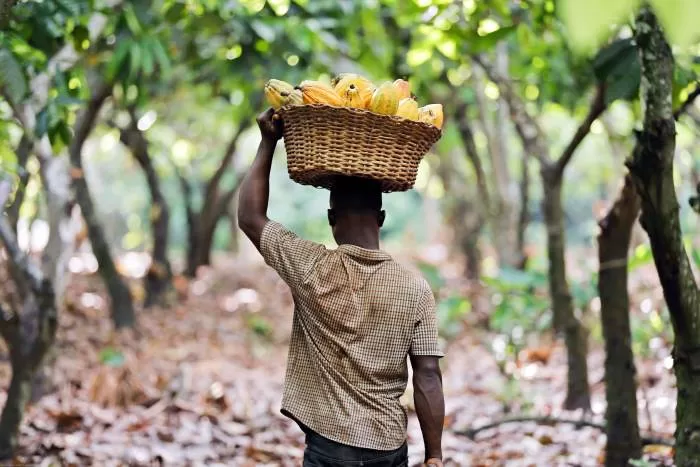The global chocolate and cocoa industry is rapidly demanding traceable cocoa that is certified and produced in a sustainable manner.
In Ghana, licensed buying companies are leading the drive for farmers to implement better farming and management practices in exchange for premium price on their produce.
But there are calls for the industry regulator, COCOBOD, to play a lead role in establishing a Ghanaian standard, independent of external interest in the cocoa trade.
This report looks at the impact of cocoa certification on farmers’ livelihood and the need to harmonize the various certification programmes.
Cocoa is an essential commodity in the Ghanaian economy.
The cash crop is the leading agricultural export and generates about 2 billion dollars in foreign exchange annually.
The industry is the source of income for over 800,000 families, mostly in rural communities.
Small-scale farming dominates Ghana’s cocoa sector with production areas averaging between 1.2 and 2.2 hectares.
Industry regulator, the Ghana Cocoa Board (COCOBOD), plays a major role in linking smallholder farmers to global markets, which is a challenge in agricultural development across Africa.
The regulator manages internal prices for cocoa and provides inputs and other services to farmers to enhance productivity.
But the cocoa sector is facing a number of challenges related to smallholder production.
65-year old Olivia Manu has been working on a two and half acre cocoa farm for the past fifteen years at Atobrakrom in the Amansie West district of the Ashanti region.
She harvests less than three bags of cocoa on her entire farm at the end of each crop season. Olivia gets discouraged with the business due to the low yields.
” I have been in the cocoa business for over a decade but I’m unable to increase my yields. The yields keep decreasing and this makes me want to stop cocoa farming but I have no alternative source of livelihood”.
Another cocoa farmer at Kaneago in the same district also shared similar concern.
“For the past six years, I manage to harvest 5 bags on my 5-acre of cocoa farm each crop season. I now focus more on my plantain and cassava farming since I earn more from it than the cocoa”, Bismark Owusu stated.
Bad farming practices contribute to low cocoa tree productivity, low income for farmers and other farm hands.
With the introduction of cocoa certification programmes, however, some cocoa farmers are recording increased yields.
Such programmes empower the farmers to grow sustainable cocoa and help them develop better drying and fermentation practices.
69-year old Thomas Oppong has been farming cocoa for the past twenty-five years. He owns a 15-acre cocoa farm at Atobrakrom and Suntreso.
[caption id="attachment_97631" align="aligncenter" width="737"]
Olivia gets discouraged with the business due to the low yields.
” I have been in the cocoa business for over a decade but I’m unable to increase my yields. The yields keep decreasing and this makes me want to stop cocoa farming but I have no alternative source of livelihood”.
Another cocoa farmer at Kaneago in the same district also shared similar concern.
“For the past six years, I manage to harvest 5 bags on my 5-acre of cocoa farm each crop season. I now focus more on my plantain and cassava farming since I earn more from it than the cocoa”, Bismark Owusu stated.
Bad farming practices contribute to low cocoa tree productivity, low income for farmers and other farm hands.
With the introduction of cocoa certification programmes, however, some cocoa farmers are recording increased yields.
Such programmes empower the farmers to grow sustainable cocoa and help them develop better drying and fermentation practices.
69-year old Thomas Oppong has been farming cocoa for the past twenty-five years. He owns a 15-acre cocoa farm at Atobrakrom and Suntreso.
[caption id="attachment_97631" align="aligncenter" width="737"] Thomas Oppong[/caption]
He used to harvest two bags on an acre but now produces seven to eight bags on the same acre.
“I was getting 30 bags on my 15-acre cocoa farm but after joining the certification programme I now harvest over 100 bags on the same acres each crop season.
“We have been taken through series of training on good farming practices such as pruning, spacing and proper application of fertilizers.
Beatrice Tawiah has also been in farming for twelve years. She now harvests 18 bags on her 3-acre farm. Previously, she could only make between 5 and 6 bags.
“Leaving the old way of farming to adopt new practices when I joined the certification programme was initially a challenge for me. But after a year of applying the good farming practice, I started seeing an improvement in my cocoa farm. I now get not less than 18 bags on my 3-acre farm. Also, I have been trained in soap making as an alternative source of income as part of the programme”.
[caption id="attachment_97630" align="aligncenter" width="737"]
Thomas Oppong[/caption]
He used to harvest two bags on an acre but now produces seven to eight bags on the same acre.
“I was getting 30 bags on my 15-acre cocoa farm but after joining the certification programme I now harvest over 100 bags on the same acres each crop season.
“We have been taken through series of training on good farming practices such as pruning, spacing and proper application of fertilizers.
Beatrice Tawiah has also been in farming for twelve years. She now harvests 18 bags on her 3-acre farm. Previously, she could only make between 5 and 6 bags.
“Leaving the old way of farming to adopt new practices when I joined the certification programme was initially a challenge for me. But after a year of applying the good farming practice, I started seeing an improvement in my cocoa farm. I now get not less than 18 bags on my 3-acre farm. Also, I have been trained in soap making as an alternative source of income as part of the programme”.
[caption id="attachment_97630" align="aligncenter" width="737"] Stephen Arthur[/caption]
34-year old Stephen Arthur said earnings from his 7-acre cocoa farm have shot up since he enrolled in cocoa certification.
“I now get between 9 to 10 bags on each acre of my 7-acre. I get enough money to buy fertilizer and other inputs. Also, I’m able to save some money from the proceeds I get after each harvest”.
The certification programme is aimed at improving the livelihoods of farmers whilst enhancing sustainability in the cocoa supply chain.
UTZ certification is one of the leading programmes attractive to cocoa farmers.
Programs Officer in charge of Training and Partnership at UTZ, Maurice Amooh, indicated that there is a clear cut difference in terms of production level between farmers who are into certification and the conventional farmers.
“When UTZ certification started in Ghana in 2009, there were certain farming practices that were not common such as pruning and other good practices. After introducing farmers to these practices, they started recording higher yields. Farmers were harvesting 250kg per hectare but are now doing 500kg per hectare and even more because they get access to inputs and training”.
Stephen Arthur[/caption]
34-year old Stephen Arthur said earnings from his 7-acre cocoa farm have shot up since he enrolled in cocoa certification.
“I now get between 9 to 10 bags on each acre of my 7-acre. I get enough money to buy fertilizer and other inputs. Also, I’m able to save some money from the proceeds I get after each harvest”.
The certification programme is aimed at improving the livelihoods of farmers whilst enhancing sustainability in the cocoa supply chain.
UTZ certification is one of the leading programmes attractive to cocoa farmers.
Programs Officer in charge of Training and Partnership at UTZ, Maurice Amooh, indicated that there is a clear cut difference in terms of production level between farmers who are into certification and the conventional farmers.
“When UTZ certification started in Ghana in 2009, there were certain farming practices that were not common such as pruning and other good practices. After introducing farmers to these practices, they started recording higher yields. Farmers were harvesting 250kg per hectare but are now doing 500kg per hectare and even more because they get access to inputs and training”.  Business Support Officer at Fairtrade Africa, Samuel Osei Kwadwo, explained that cocoa farmers engaged in certification are able to increase their yields because they are exposed to best farming practices.
“When farmers join certification, we teach them good agronomic and environmental practices which lead to increase in yields. Apart from increasing yields, farmers under certification also get premium. These lead to increase in income”.
Mr Osei Kwadwo hinted, the amount of premium Fairtrade brought to Ghana in the cocoa industry alone in 2016 is more than 10 million dollars.
But Ghana is yet to establish standards in cocoa certification to enhance the country’s export.
Director of Research, Monitoring and Evaluation at COCOBOD, Vincent Okyere Akomeah, acknowledged the positive impact of certification on farmers’ livelihood.
[caption id="attachment_97636" align="aligncenter" width="737"]
Business Support Officer at Fairtrade Africa, Samuel Osei Kwadwo, explained that cocoa farmers engaged in certification are able to increase their yields because they are exposed to best farming practices.
“When farmers join certification, we teach them good agronomic and environmental practices which lead to increase in yields. Apart from increasing yields, farmers under certification also get premium. These lead to increase in income”.
Mr Osei Kwadwo hinted, the amount of premium Fairtrade brought to Ghana in the cocoa industry alone in 2016 is more than 10 million dollars.
But Ghana is yet to establish standards in cocoa certification to enhance the country’s export.
Director of Research, Monitoring and Evaluation at COCOBOD, Vincent Okyere Akomeah, acknowledged the positive impact of certification on farmers’ livelihood.
[caption id="attachment_97636" align="aligncenter" width="737"] Vincent Okyere Akomeah[/caption]
He says the regulator has put together a committee to come out with a Ghana Climate Smart Cocoa Production Strategy as a step to establish the Ghanaian standard.
“If you look at the certification programmes, they are in for the good of the farmer. Cocobod has put together a committee to come out of what we call Ghana Climate Smart Cocoa Production Strategy. The idea is that, there are certain protocols we want our farmers to follow and as they adopt them, they will become Ghana Standard. In that case our position will be that, anybody who brings standards that do not conform to the Ghana Standard, we will not accept it.
Mr Akomeah said the committee is almost done with its work and will soon submit it final report to Cocobod for it to be adopted.
Vincent Okyere Akomeah[/caption]
He says the regulator has put together a committee to come out with a Ghana Climate Smart Cocoa Production Strategy as a step to establish the Ghanaian standard.
“If you look at the certification programmes, they are in for the good of the farmer. Cocobod has put together a committee to come out of what we call Ghana Climate Smart Cocoa Production Strategy. The idea is that, there are certain protocols we want our farmers to follow and as they adopt them, they will become Ghana Standard. In that case our position will be that, anybody who brings standards that do not conform to the Ghana Standard, we will not accept it.
Mr Akomeah said the committee is almost done with its work and will soon submit it final report to Cocobod for it to be adopted.  To make cocoa farming lucrative and sustainable, COCOBOD has introduced hand pollination and pruning to enable farmers cultivate not less than 20 bags of cocoa on an acre of farm.
An increase in best practices under a certified environment will not only increase farmers’ income but will help the country achieve its one million target of annual production.
By Ibrahim Abubakar | 3news.com | Ghana]]>
To make cocoa farming lucrative and sustainable, COCOBOD has introduced hand pollination and pruning to enable farmers cultivate not less than 20 bags of cocoa on an acre of farm.
An increase in best practices under a certified environment will not only increase farmers’ income but will help the country achieve its one million target of annual production.
By Ibrahim Abubakar | 3news.com | Ghana]]>
Cocoa certification: Impacts on farmers’ livelihood and industry
Reading Time: 7 mins read
Recent Posts
- Seidu Agongo launches month-long Ramadan donations to mothers
- IWD: You are powerful, capable – Konadu Agyeman-Rawlings celebrates women
- Anas thanks Emir of Gombe for naming a Centre at North Eastern University after him
- Anas Aremeyaw Anas Multimedia Centre Commissioned at North Eastern University, Gombe
- Amend Transition Act to reflect current governance structure – Benjamin Quashie
- Evidence abounds that lithovit is efficacious: A-G defends withdrawal of Opuni-Agongo case
- Full Text: Check Attorney-General’s justification for discontinuing high-profile cases
- OSP declares Ken Ofori-Atta wanted in multiple corruption cases
Popular Stories
-
IWD: You are powerful, capable – Konadu Agyeman-Rawlings celebrates women
-
A Voice from the Village Talkative: Why Prez Akufo-Addo must buy brand new cars
-
Stephen Hawking dies aged 76
-
Distraction: Ursula explains why govt is ‘speaking’ for Kelni GVG
-
Western North Region gets ‘independence’ with overwhelming 99.52% YES votes
@2023 – Newstitbits.com. All Rights Reserved.
























